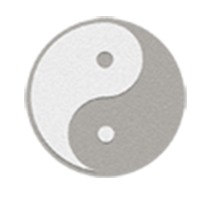The I Ching, or Book of Changes is based on the Tao. The Tao is the fabric of the universe that contains and connects every conceivable and inconceivable aspect and manifestation of consciousness. The Tao itself is undefined.
The primary manifestation of the Tao is comprised of the dynamic state of polarity of yin and yang. It is a system whose universe describes every possible state of existence. It is constantly flowing and changing its balance between the two extreme polarities, total yin (earth) and total yang (heaven).
The I Ching as a book describes a structure that is designed to divine the relative quantities of yin and yang in any moment and circumstance and the tendency for their direction of change. This structure, known as a form is a physical structure developed by mind that links to subtle structures of consciousness.
Through the use of such forms, physical orthogonal mappings of the mind (as produced by reason, relating to time and space as discrete phenomena) can be transformed into transverse experiences that transcend time and space (as produced in the realm of shuniya), resulting in new orthogonal structures that can be perceived by the mind and the senses. Using a form to produce a transverse experience in this way is called divination. Divining using the form of the I Ching produces an answer to a question. Engaging the I Ching or any form that produces a transverse experience requires intuition to facilitate the experience. Intuition is a byproduct of living in a state of shuniya. Another example of a form that produces a transverse experience is White Tantric Yoga. In this case, the form is facilitated by the intuition of the Mahan Tantric.
The I Ching itself is the ancient Taoist Oracle, which is formless. Its foundation is pure consciousness. One brings form to it by first relating intuitively with the Oracle in the form of a question. Then, performing a physical divining process. Then, assigning the result of the divination to one or two of the set of 64 predefined forms known as hexagrams. Then, consulting narratives provided by a translator of the selected hexagram(s) from original Chinese texts and oral tradition. Finally, interpreting these narratives relative to the original question.



 “When man has a circumvent force that is very strong, he is neither negative to himself nor to another person.” Yogi Bhajan
“When man has a circumvent force that is very strong, he is neither negative to himself nor to another person.” Yogi Bhajan